Highway patrol
This article needs additional citations for verification. (January 2008) |
A highway patrol is a
Functions
Duties of highway patrols or traffic police may include the following:
- Accident investigation
- Gathering evidence to determine the cause of a roadway accident.
- Commercial vehicle enforcement
- Enforcing highway laws related to commercial transport, including weight limits and hazardous materials rules.
- Education
- Providing public information, handouts, and displays to encourage safe driving and usage of the roads.
- Emergency response
- Securing the scene of a traffic accident by using cones and flares as well as providing first aid to the injured.
- Law enforcement
- Assisting local police in rural areas, and keeping an eye out for non-traffic violations.
- Maintenance
- Observing and reporting damage to the roadways, and conducting hasty road surveys after disasters or the passage of inclement weather.
- Traffic enforcement
- Enforcing laws and regulations intended to improve traffic safety, such as speed limits.
Argentina
In Argentina, traffic policing is the responsibility of the Argentine National Gendarmerie.
Australia
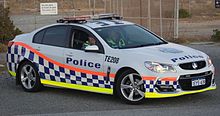
In Australia, traffic policing is the responsibility of the state police forces (with the notable exception of the Australian Capital Territory, under the responsibility of the Australian Federal Police). Each force has its own traffic sections, often a local section in each area and a statewide section.
Austria
In Austria, traffic policing on highways is the responsibility of the
Belgium
In Belgium, traffic policing on highways is the responsibility of the Wegpolitie - Police de la Route (WPR) a section of the Federal Police (former Gendarmerie).
Brazil

In Brazil, traffic policing is the responsibility of state and federal police forces accordingly to the highway administration status. State administered highways (usually shorter, within state borders, two-way, single lane, lower traffic) are policed by a branch of the Military Police forces, called State Highway Military Police. At the same time Federal highways and roads (longer, crossing state borders, some double lane and high-traffic) are the responsibility of the Federal Highway Police.
Canada
In Canada traffic policing on highways is primarily the responsibility of the Royal Canadian Mounted Police, except for in the provinces of Ontario, Quebec, Alberta, Saskatchewan and New Brunswick. In these provinces, the following agencies are responsible for highway patrol:
- Ontario Provincial Police
- Sûreté du Québec
- Alberta Sheriff Highway Patrol
- Saskatchewan Highway Patrol
- New Brunswick Highway Safety Enforcement
In Newfoundland and Labrador, the Royal Newfoundland Constabulary serves only major metropolitan areas[1] and highway policing is the responsibility of the Royal Canadian Mounted Police. In British Columbia, provincial RCMP Traffic Services rebranded themselves as the British Columbia Highway Patrol. British Columbia Highway Patrol vehicles have their own liveries without the RCMP logo but unlike other highway patrol agencies, they are not a separate agency. Instead they remain part of the RCMP. In New Brunswick, Inspections and Enforcement New Brunswick officers assist provincial RCMP officers with traffic enforcement as the RCMP dismantled all but one of its traffic units in the province. In 2018
Colombia
In
Croatia
In Croatia, traffic police special department is the national motorway patrol, patrols the motorways in Croatia. Missions include the prevention and detection of driving offences.
Czech Republic
In the Czech Republic, traffic policing on highways is the responsibility of the Policie CR.
Denmark
In Denmark, traffic policing on highways is the responsibility of the Danish National Police.
Finland
In Finland, traffic policing on highways is the responsibility of the Finnish National Police.
France
In
Germany
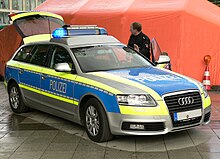
In Germany, traffic policing on highways is the responsibility of the Autobahnpolizei section of the Landespolizei.
Hungary
In, Hungary, traffic policing on highways is the responsibility of the Hungarian National Police (Rendőrség).
India
In India, some states have formed Highway Patrol Divisions under their respective state police departments. such as Karnataka Highway Patrol, Kerala Highway Police, Tamil Nadu Highway Patrol, Maharashtra Highway Police, etc. In states where there is no highway police system, traffic policing duties on highways are performed by the traffic police of the respective state police forces.
Indonesia
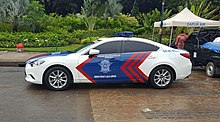
In
Ireland
The Garda Traffic Corps, a specialised unit of the Garda Síochána (the national police force for the Republic of Ireland) is responsible for patrolling the countries motorways and other national routes. They patrol using motorbikes, off-road/4X4s, and a mixture of marked and unmarked high-powered saloon cars.
Italy
In Italy, traffic policing on highways is the responsibility of the Polizia Stradale section of the civilian Polizia di Stato and the Gendarmerie force of the Carabinieri.
Japan
In Japan, traffic policing on highways is the responsibility of the Expressway Traffic Police Units (高速道路交通警察隊, Kōsoku-dōro kōtsu-keisatsu-tai), operational units of the traffic department within each prefectural police agency.[2]
Liechtenstein
Despite the non-existence of motorways due to the country's small size, the Liechtensteiner National Police, the country's small national police force, is in charge of traffic matters.
Luxembourg

In
Malaysia

In Malaysia, traffic policing on highways is the responsibility by Royal Malaysia Police. JPJ also charged with the responsibility of undertaking registration and licensing of drivers and all motor vehicles and trailers in Malaysia.
Mexico
In
Monaco
Despite the non-existence of motorways due to the country's small size, the
Morocco
In Morocco, traffic policing on highways is the responsibility of Royal Moroccan Gendarmerie, the country's national gendarmerie force.
Netherlands
In the Netherlands, policing on the highways falls under the purview of the Dienst Infrastructuur, which is one of the Landelijke Eenheid (national police services, as opposed to the regional forces). Their primary focus is to conduct traffic stops with the aim to detect criminal activities and to intercept weapons, money and drugs. Which can be used for criminal activities. further they work with agencies to prevent international drug trade. Within the Dienst Infrastructuur there is an organisation called FIT (Flexibel Interventie Team) they are an organization that specializes in tackling embezzlement and theft of cars and tackling drug transport via cars.
New Zealand
In New Zealand the Highway Patrol operates almost exclusively on state highways and is a division of New Zealand Police.[4] Formerly traffic law enforcement was the responsibility of the Traffic Safety Service of the Ministry of Transport. The MOT had no law enforcement authority beyond traffic. The MOT merged with the Police in 1992 and the Highway Patrol was re-established as its own unit in 2001.[5]
Norway
In Norway, traffic policing on highways is the responsibility of National Mobile Police Service of the Norwegian Police Service.
Pakistan
In Pakistan, traffic policing on National Highways And Motorways is the responsibility of National Highways & Motorway Police.
Philippines
In the
Furthermore, the
Poland
In
Portugal
In
Russia
In
Spain
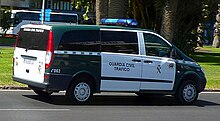

In
Sri Lanka
In
Sweden
In Sweden, traffic policing is the responsibility of the Swedish Police Authority. All Swedish police officers have the authority to stop drivers but it is only the police officers within the Swedish Traffic Police division who have the authority to clamp vehicles etc.
Taiwan
In
Tunisia
In Tunisia, traffic policing on highways is the responsibility of Tunisian National Guard, the country's national gendarmerie force.
Turkey
In Turkey, road traffic duties are carried out by Traffic Police under Turkish National Police and Traffic Gendarmerie under General Command of Gendarmerie in their respective areas of responsibilities.
United Kingdom
In the United Kingdom, traffic policing on highways is the responsibility of the Roads Policing Unit of the territorial police force. In some cases, police forces combine their roads policing units, for example the Central Motorway Police Group and North West Motorway Police Group.
United States
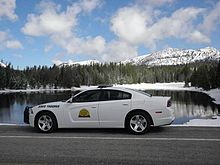
Many
Some highway patrol organizations, such as the
Highway patrol and state police officers are often referred to as a "state trooper". Historically, a troop was a small cavalry unit. Many state police forces originated as mounted paramilitary forces who were stationed in barracks like soldiers, hence the term "trooper." Some agencies, particularly on the East Coast, refer to their state police offices as "barracks", although troopers generally do not reside there. Other state police forces, particularly highway patrols as in California, have always modeled themselves after police officers who simply commute to work like ordinary civilians. Like police officers, they use the title "officer." Other states use the term "Patrolmen" in reference to members of the State Police or Highway Patrol.
Many states and their Departments of Transportation have organized government-run freeway service patrols, Highway Assistance Patrols, or Highway Safety Patrols, to assist with highway emergencies as needed. While not law enforcement personnel, these persons provide free service to motorists in distress, and secure lanes of traffic, provide emergency medical assistance, request tow trucks for vehicles in inconvenient or dangerous locations, remove debris from the roadway after a crash, and resolve minor disabled vehicle problems, such as flat tires, jumpstarts, or pushing a disabled vehicle out of travel lanes. Many of these patrols work directly with the State Police and Highway Operations departments of their state, and respond to assistance when a citizen calls 911 for minor roadside assistance duties.[citation needed]
See also
- Traffic police
- Traffic warden
- State police
- Police
- Chief of police
- Constable
References
- ^ "Constabulary Website". Retrieved 27 January 2012.
- NCID BN15987654.
- ^ "Police de la route".
- ^ "Road policing teams and units".
- ^ Noted. "When traffic cops used to rule New Zealand roads". Noted. Archived from the original on 2019-05-04. Retrieved 2019-06-19.
- ^ "El PNV expulsa a la Guardia Civil de Tráfico de Navarra gracias al PSOE".
- ^ "NC Department of Crime Control and Public Safety". Nccrimecontrol.org. Archived from the original on 2007-02-02. Retrieved 2009-06-11.
- ^ "Texas DPS Organization Chart" (PDF). www.dps.texas.gov. 27 Dec 2017. Archived from the original (PDF) on 26 June 2018.
- ^ Terrance D. Martin. "Official Directory of State Patrol and State Police". Statetroopersdirectory.com. Retrieved 2009-06-11.
- ^ "Iowa State Patrol Division - Emergency Contacts While Traveling in Iowa". Dps.state.ia.us. 2009-05-19. Retrieved 2009-06-11.
